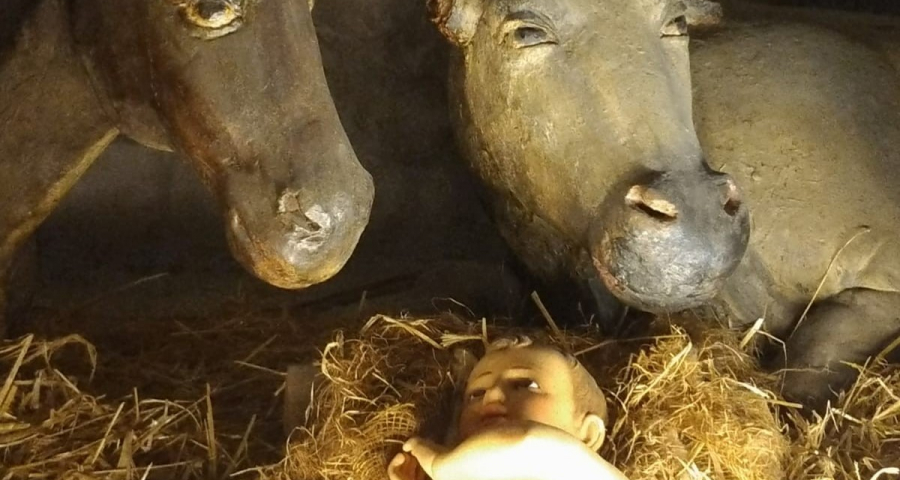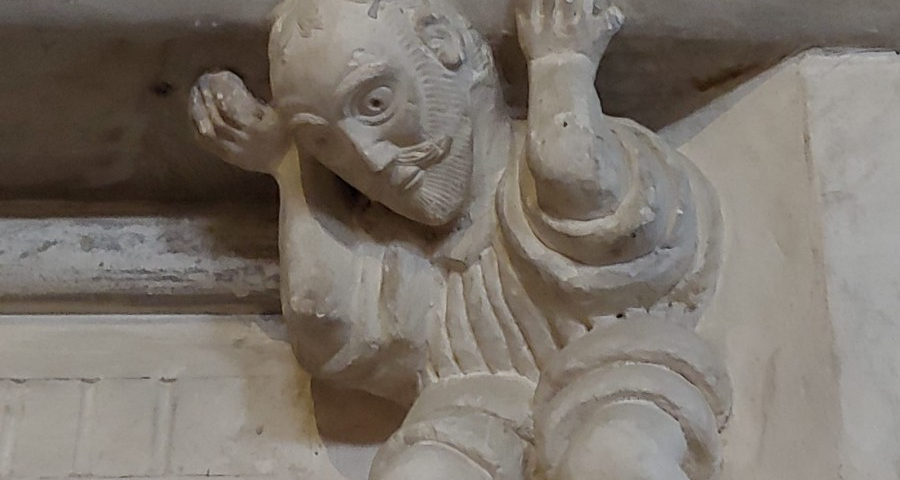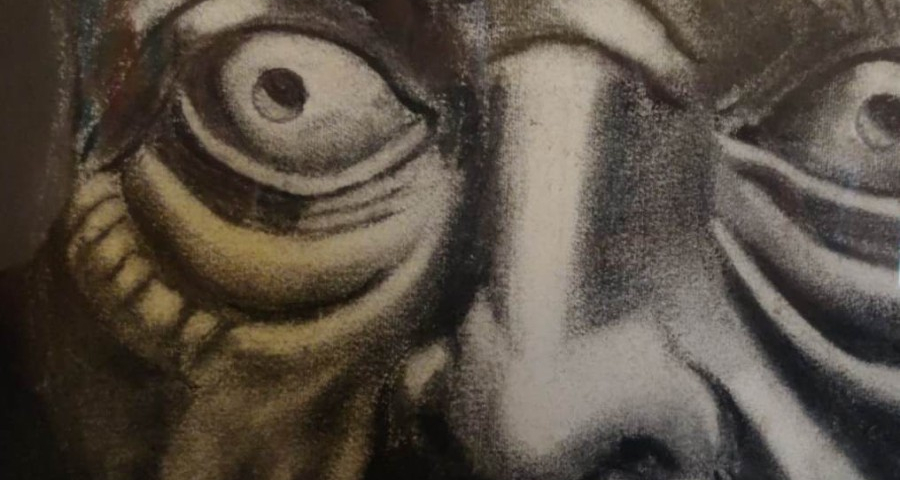The exile and the promise/7 - Not in the "centres" of powerful false prophets, but in the suburbs and among those who come last
by Luigino Bruni
Published in Avvenire 23/12/2018
 «I beg you: God, dreamer of mine, continue to dream about me»
«I beg you: God, dreamer of mine, continue to dream about me»
J. L. Borges, History of the Night
The Bible is a story of migration, exile, nomadic people and moving tents, it is the stupendous narration of a wandering Aramaic following a voice within an infinite horizon. In a village of exiles near Babylon, by order of YHWH, prophecy took the form of a migrant, and homo migrans became biblical words in the flesh and form of one of the greatest prophets. And it stayed there forever. Every migrant on earth can recognize and read his own story in the story of Ezekiel, a poor and exiled prophet, a priest without a temple of a defeated God, and pray with his words when he has exhausted his own, feeling him close as a travelling companion in his journey and night time escapes by land and sea, looking from behind the same veil shading the eyes so as not to die of pain.
More than a year has passed since the beginning of Ezekiel's prophetic activity, but his countrymen, who like him find themselves in exile, understand neither the words nor the signs of the prophet. The young prophet receives a new and specific word from YHWH that invites him to continue beyond his failure: «The word of the Lord came to me: “Son of man, you are living among a rebellious people. They have eyes to see but do not see and ears to hear but do not hear"» (Ezekiel 12,1-2). Ezekiel knew that his mission was impossible, because he had listened to his words on the day of his calling («Son of man, I am sending you to the Israelites, to a rebellious nation»: Ezekiel 2,3). But while he is feeling the truth of those first-day words on his own flesh, a new word repeats to him what he already knew. Because the announcement of failure is always very different from the experience of failure, to which one never is fully prepared.
Listening to the words of yesterday’s annunciation while we are struggling and trying to resist today, is a gift that allows us to continue the struggle knowing that we will not win. Sometimes the first words return from the same voice and (almost) in the same exact way; other times they come through the voice of a friend, or through the voice of the poor or that of the pain of the earth. And so it may happen that a prophet does not quite capture that first voice because it arrives "as a subtle voice of silence" when he was expecting a strong wind or an earthquake. But it can also happen that those second words never really come at all. There are prophets who have walked all their lives with only the first words of the day of their calling to accompany them. Yet they continued on their journey and became words for others.
YHWH, however, speaks to Ezekiel once again, and despite the failure he is experiencing, he asks him to continue to produce prophetic gestures and words: «“Therefore, son of man, pack your belongings for exile and in the daytime, as they watch, set out and go from where you are to another place. Perhaps they will understand, though they are a rebellious people. 4 During the daytime, while they watch, bring out your belongings packed for exile. Then in the evening, while they are watching, go out like those who go into exile. 5 While they watch, dig through the wall and take your belongings out through it. 6 Put them on your shoulder as they are watching and carry them out at dusk. Cover your face so that you cannot see the land”» (Ezekiel 12,3-6). Ezekiel welcomes the word: « So I did as I was commanded» (Ezekiel 12,7). In a time, like ours, dominated by the ideology of success and the obsession to re-enter the group of "winners", the prophets tell us that there can be a good life with defeats and failures as well, and that the good way in life is frequented almost exclusively by "losers" who continue to walk with dignity and with their heads held high despite their defeats. A prophet's failure is not the failure of his prophecy, because failure and people not listening are intrinsic parts of a prophecy and help to set it apart from false ones.
Let's stop for a moment, let's take a short break and let's take a good look at this prophet who embodies the condition of the exiled, the refugee, and the immigrant. This chapter of the book of Ezekiel repeats many times that the prophet made those gestures of his "before their eyes". Our eyes must be among those "eyes" too, because those gestures-signs of Ezekiel continue to be alive and equally effective if we are able to see them here and now, if we observe him clearly performing, exposed in the town square. And so we see him prepare his luggage for the exile and set out at sunset leaving his home and village. In the darkness, like so many other migrants, with their burden on their shoulders, with their faces covered by a veil to prevent their wet eyes from "seeing the country" and thus avoid lingering in nostalgia for the house they have left forever - when an immigrant departs he will have a better life in his new land, if it doesn’t indulge to much in the memory of the house left behind, this is why he mustn’t start with that last image engraved in his pupils (nostalgia is always terrible when you wish or must start over).
That prophetic sign of Ezekiel’s was not easy to decipher. Most would have seen the prophecy of returning home to Jerusalem. The false prophets, present and operating even in exile, sold the certainty of an imminent return to their homeland and the end of exile as their first commodity. But Ezekiel reveals that there is a radically different and shocking meaning: «Say to them, ‘I am a sign to you.’ “As I have done, so it will be done to them. They will go into exile as captives» (Ezekiel 12,11). Hence, exile is the destiny of those who remained at home: not only will the first deported to Babylon not return, but the rest of the people will soon be deported as well (as will indeed be the case a few years later, in 587). So here is the first surprise: the gesture, although performed among the exiles, was addressed to those who had remained in Jerusalem. Who knows how many Ezekiels are now prophesying in our non-welcoming refugee camps, and from there performing gestures that are messages really addressed to us? If we want to hear some true words about the destiny that awaits us, we must not look for them in the high chairs and temples of our "centres", where many false prophets unfortunately operate. We could however find them in the suburbs, in deportation, in exile, in endless peregrinations, where gestures and signs take place all the time, signs that we think do not concern us, but instead are directed precisely at us who, like Ezekiel's fellow citizens, are too hard-headed to understand them , welcome them, and allow them to convert us.
Then there is another essential element. Ezekiel really prepared himself to emigrate, he really dug through the wall, and really went out at sunset and wandered during the night as an exile out of the country. Prophetic gestures are like living flesh, otherwise they would just be empty, ineffective and useless. They are "smaller" than the real event, but they are equally true, this is how they speak to us, while becoming a sacrament and a sign: «For I have made you a sign to the Israelites» (Ezekiel 12,6). This marvellous sign continues to say true words of flesh: "This word of the Lord was addressed to me: «The word of the Lord came to me: “Son of man, tremble as you eat your food, and shudder in fear as you drink your water"» (Ezekiel 12,17-18). Once again it is the prophet's body to be prophesying, and he tells the inhabitants of Jerusalem that the time is coming for the siege and then for the exile, when bread and water will be scarce and consumed in fear and anguish that will make the whole body tremble. After the paralysis and silence, it is once again his body that speaks the most important words through tremors and gasps, perhaps even real convulsions. We do not know how long this experience of eating and drinking while his hands and his whole body trembled all over lasted for Ezekiel, but we know that it was a real and true experience that both touched him and wounded him, and perhaps marked him in the flesh for the rest of his life, because they were true and embodied experiences.
The hard struggle that the prophets have always lead against false prophets revolves around one word truth. If a false prophet had been there in Ezekiel’s place, he would have put on a mask to interpret a script he wrote himself. But not Ezekiel: while performing the script that another has composed for him, in performing it he becomes what he represents. In every prophetic gesture that wonderful experience that all actors have experienced at least once in their life is repeated, when after having acted out many scripts and the same script many times over, one evening while they are in that same theatre repeating the same words, the miracle happens: suddenly stage, audience, author and script disappear, and the actor becomes the words and gestures he is interpreting. How to relive that moment that can (and must) happen to those who really work hard, when after years of executing orders and external directives, suddenly one day managers, hierarchies and tasks all disappear, and we realize that our work has become all soul, cancelling the distance that separated it from our heart. Or the experience of someone who, after reciting prayers and psalms learned and inherited for decades, finally through a different liturgy understands that he or she has really become the prayer he is reciting, where the holiest words are those uttered through his or her trembling and wounded body.
These experiences, both extraordinary and sometimes unique, are the normality in the life of a prophet, who is able to deliver a different kind of words because before he said them he "ate them", because they became real luggage on his shoulders, real holes in the wall of his house, bread and water really ingested during spasms of convulsions. Word made flesh. The people of Israel were not converted, did not understand and did not accept Ezekiel’s message. They did not understand that the prophet himself was a marvellous sign sent for them. He came among his own but his own people did not accept him. Six centuries after Ezekiel, the prophet who became a sign of exile and migration, a child, a son, became a sacrament and a marvellous sign for us. A divine migrant, who did not wear a veil to cover his eyes when he left, because he wanted the image of his "house" to remain imprinted in his pupils, so that we could when looking at them could see it. Merry Christmas!
Download pdf article in pdf (136 KB)













